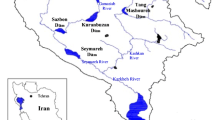Abstract
Optimizing the utilization of reservoirs has become an indispensable part of water resources planning. One of the challenges is how to overcome the conflict between the flood control and the revenue generated from hydropower energy. The Ostour and Pirtaghi reservoirs, which are crucial in Iran water system, are selected in this study. The aim is to find the optimal values for water release from each reservoir over a 12-month period to maximize both objective functions. The imperialist competitive algorithm is employed to optimize this multiobjective-nonlinear problem with complex constraints. It is observed that the imperialist competitive algorithm has a fast convergence and it is highly adaptable to defined constraints such as water release limitation, minimum downstream flow, water balance in reservoirs. This study results in better flood control and more revenue from the sale of hydropower energy. The paper also provides a systematic guidance to properly formulate and solve a multi-objective problem.








Similar content being viewed by others
References
Afrozi MN, Aghdam MH, Naebi A, Aghdam SH (2011) Simulation and optimization of asynchronous AC motor control by particle swarm optimization (PSO) and emperor algorithm. In: 2011 UKSim 5th European symposium on computer modeling and simulation 251–256, IEEE
Afshar A, Emami Skardi MJ, Masoumi F (2015) Optimizing water supply and hydropower reservoir operation rule curves: an imperialist competitive algorithm approach. Eng Optim 47(9):1208–1225
Afshar MH (2013) Extension of the constrained particle swarm optimization algorithm to optimal operation of multi-reservoirs system. Int J Electr Power Energy Syst 51:71–81
Ahmadebrahimpour E (2019) Optimal operation of reservoir systems using the wolf search algorithm (WSA). Water Sci Technol Water Supply 19(5):1396–1404
Ardakani MK (2016) The impacts of errors in factor levels on robust parameter design optimization. Qual Reliab Eng Int 32(5):1591–1985
Ardakani MK, Noorossana R (2008) A new optimization criterion for robust parameter design–the case of target is best. Int J Adv Manuf Technol 38(9–10):851–859
Ardakani MK, Wulff SS (2013) An overview of optimization formulations for multi-response surface problems. Qual Reliab Eng Int 29(1):3–16
Ardakani MK, Noorossana R, Niaki STA, Lahijanian H (2009) Robust parameter design using the weighted metric method—the case of ‘the smaller the better’. Int J Appl Math Comput Sci 19(1):59–68
Atashpaz-Gargari E, Lucas C (2007) Imperialist competitive algorithm: an algorithm for optimization inspired by imperialistic competition. In: Evolutionary computation. CEC 2007. IEEE Congress, 4661–4667
Azadnia A, Zahraie B (2010) Application of multi-objective particle swarm optimization in operation management of reservoirs with sedimentation problems. In: World environmental and water resources congress 2010: challenges of change, 2260–2268
Chang FJ, Chen L (1998) Real-coded genetic algorithm for rule-based flood control reservoir management. Water Resour Manag 12:185–198
Chiang PK, Willems P (2015) Combine evolutionary optimization with model predictive control in real-time flood control of a river system. Water Resour Manag 29:2527–2542
Deb K (2014) Multi-objective Optimization. In: Burke E, Kendall G (eds) Search methodologies. Springer, Boston, MA
Haddad OB, Hosseini-Moghari SM, Loáiciga HA (2015) Biogeography-based optimization algorithm for optimal operation of reservoir systems. J Water Resour Plan Manag 142(1):04015034
Hojjati A, Monadi M, Farid A, Mohammadi M (2018) Application and comparison of NSGA-II and MOPSO in multi-objective optimization of water resources systems. J Hydrol Hydromech 66:323–329
Hosseini-Moghari SM, Morovati R, Moghadas M, Araghinejad S (2015) Optimum operation of reservoir using two evolutionary algorithms: imperialist competitive algorithm (ICA) and cuckoo optimization algorithm (COA). Water Resour Manag 29(10):3749–3769
Idoumghar L, Chérin N, Siarry P, Roche R, Miraoui A (2013) Hybrid ICA–PSO algorithm for continuous optimization. Appl Math Comput 219(24):11149–11170
Jia B, Simonovic SP, Zhong P, Yu Z (2016) A multi-objective best compromise decision model for real-time flood mitigation operations of multi-reservoir system. Water Resour Manag 30:3363–3387
Jothiprakash V, Arunkumar R (2013) Optimization of hydropower reservoir using evolutionary algorithms coupled with chaos. Water Resour Manag 27:1963–1979
Karami H, Mousavi SF, Farzin S, Ehteram M, Singh VP, Kisi O (2018) Improved krill algorithm for reservoir operation. Water Resour Manag 32(10):3353–3372
Kumar DN, Reddy MJ (2006) Ant colony optimization for multi-purpose reservoir operation. Water Resour Manag 20:879–898
Li L, Liu P, Rheinheimer DE, Deng C, Zhou Y (2014) Identifying explicit formulation of operating rules for multi-reservoir systems using genetic programming. Water Resour Manag 28:1545–1565
Mehdipour EF, Haddad OB, Orouji H, Marino MA (2013) Application of genetic programming in stage hydrograph routing of open channels. Water Resour Manag 27:3261–3272
Noori M, Othman F, Sharifi MB, Heydari M (2013) Multi objective operation optimization of reservoirs using genetic algorithm (case study: Ostoor and Pirtaghi reservoirs in Ghezel Ozan Watershed), 2nd international conference on environment. Energy Biotechnol 51(10):49–54
Tayfur G (2017) Modern optimization methods in water resources planning, engineering and management. Water Resour Manag 31(10):3205–3233
Yaseen ZM, Karami H, Ehteram M, Mohd NS, Mousavi SF, Hin LS, El-Shafie A (2018) Optimization of reservoir operation using new hybrid algorithm. KSCE J Civ Eng 22(11):4668–4680
Zhao T, Zhao J, Yang D (2014) Improved dynamic programming for hydropower reservoir operation. J Water Resour Plann Manage 140(3):365–374. https://doi.org/10.1061/(ASCE)WR.1943-5452.0000343
Acknowledgements
The authors would like to thank two anonymous reviewers and the associate editor of the journal for their constructive comments, which significantly helped to improve the quality of the paper.
Author information
Authors and Affiliations
Corresponding author
Ethics declarations
Conflict of Interest
None.
Additional information
Publisher’s Note
Springer Nature remains neutral with regard to jurisdictional claims in published maps and institutional affiliations.
Rights and permissions
About this article
Cite this article
Rahimi, H., Ardakani, M.K., Ahmadian, M. et al. Multi-Reservoir Utilization Planning to Optimize Hydropower Energy and Flood Control Simultaneously. Environ. Process. 7, 41–52 (2020). https://doi.org/10.1007/s40710-019-00404-8
Received:
Accepted:
Published:
Issue Date:
DOI: https://doi.org/10.1007/s40710-019-00404-8




